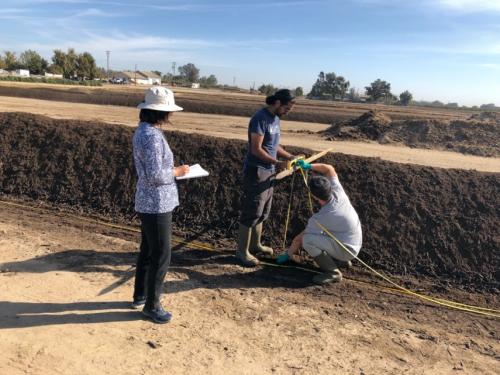
UC Davis Hosts Virtual Field Day on Composting Dairy Manure and Almond Woody Biomass
On March 18, the UC Davis Healthy Soils Project hosted a virtual field day focused on producing and applying compost products from almond and dairy waste. The virtual field day is an opportunity for UC Davis faculty and students to connect and share their research with agricultural producers across California.
The Healthy Soils Project is led by biological and agricultural engineering (BAE) professor Ruihong Zhang in partnership with her graduate students and researchers in four departments across UC Davis. Since 2019, the project has sought to produce compost products from dairy manure and woody almond biomass such as sticks and twigs with and without pelletization—the processing of the material into densified pellets. The goal is to characterize these products and test their effectiveness as safe, nutrient-rich and environmentally-friendly organic amendment for almond orchards.
The event began with an introduction from Zhang and remarks from the project’s sponsors—the California Department of Food and Agriculture, the Almond Board of California and the California Dairy Foundation—followed by three talks and a Q&A session.
The first was from Aaron Wickstrom of Wickstrom Dairy, a family-owned farm in Hilmar, CA and one of the project’s industry partners. Wickstrom, who oversees sustainable dairy operations, gave an overview of the farm’s operations and philosophy and how he’s integrated technology in his farms to benefit his business, his animals and the environment.

Hossein Edalati, a Ph.D. student working with Zhang, then presented his research on four types of compost—pure manure, a manure/almond stick mixture, pelletized pure manure and pelletized manure/stick mixture—and how effective each is in an experimental plot. He has already proved that the samples don’t contain harmful pathogens like E. coli and salmonella and later this year, he plans to show the effectiveness of these products in cutting carbon emissions, improving soil health and reducing greenhouse gases.
Sat Darshan Khalsa, an assistant project scientist in the Department of Plant Sciences, shared his research on compost in almond orchards. He demonstrated how carbon and nitrogen cycles work and the importance of adding nitrogen to the soil to keep it healthy and how dairy operators and almond growers and processors can work together to reduce each other’s waste. The biomass from almond production can be used as bedding for dairies, and diary manure can help fertilize almond orchards.
As the three-year Healthy Soils Project concludes its second year, the group plans to host more field days, both virtually and in the field, including an event on July 22 in coordination with UC Waste Recycling. They hope to use these field days to further connect with producers and show how UC Davis research can directly benefit the industry.
The full video of the field day is available on YouTube:
